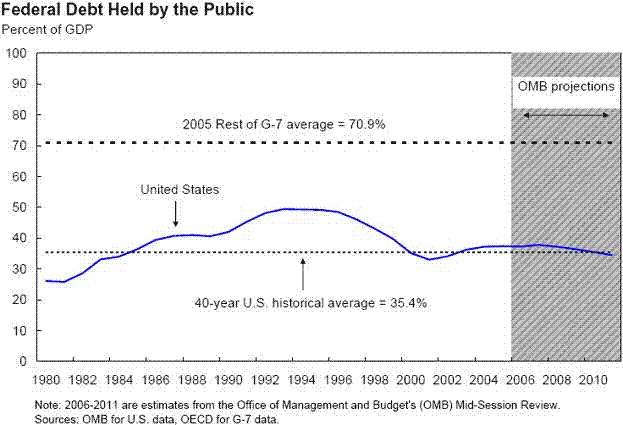
110th's Deficit Worries As I've mentioned before, I remain a sharp critic of excessive spending, the federal debt, and the deficit. Glaringly simple plans such as the Republican Study Committee's "Contract with America: Renewed" present decent methods of balancing the budget over the next five years without hiking taxes.
Nonetheless, the deficit isn't going to strangle the economy anytime soon, and while numerically it's "skyrocketing," what I've repeatedly pointed out is that the quantitative examinations aren't sufficient. Taken in context of GDP growth, this year's deficit will be economically insignificant.
Heritage called the rhetoric last week, and CATO was doing it several years ago. Brian Riedl (Heritage):
- The public debt now stands at 37 percent of GDP, which is below the post-war average of 44 percent of GDP and lower than every year during the 1990s. By historical standards, the public debt is small. The much larger threat is the trillions in future costs associated with Social Security, Medicare, and Medicaid.TheThe
 The real problem, and what the research was focusing on, lies in the entitlement tsunami and general spending growth. I addressthatedseds to place more focus on working its way out of entitlement disaster and hashing spending than tax hikes to alleviate the deficit.
The real problem, and what the research was focusing on, lies in the entitlement tsunami and general spending growth. I addressthatedseds to place more focus on working its way out of entitlement disaster and hashing spending than tax hikes to alleviate the deficit.Negative Savings and Stagnant Wages
After exhausting all other alternatives (most recently the death of "tax cuts for the rich") the criticisms have moved largely to lack of wage growth and a negative savings rate. They have a bit of a point about wage growth, it has been stunted in a statistical classification sense, yet one needs to remember the booming role of benefits in total compensation. Productivity and compensation are both substantially up, and when I'm earning more money I don't particularly care if the wealthy are earning faster.
As for the savings rate, Neil Cavuto, while a bit more of entertainer than an economist (though I still want him to run for President) summed it up succinctly and informally:
It [the negative savings rate figure] leaves out retirement plans, pension plans, 401(k) plans, stocks, mutual funds and a myriad of other investments. It leaves out the simple fact fully seven out of 10 Americans are invested in the stock market.
And it leaves out their homes — for many, an enormous source of equity, even with the recent downturn in prices. I'm not saying we Americans are wonderful savers. We're not.
But I'll tell you what: We're apparently a heck of a lot better savers than workers in France. According to an AXA Equitable Global retirement survey out this week, we save twice as much as they do.
Ditto Italy and Germany. And nearly 10 times what they do in China.
In all, we're putting away about 700 bucks a month.


No comments:
Post a Comment